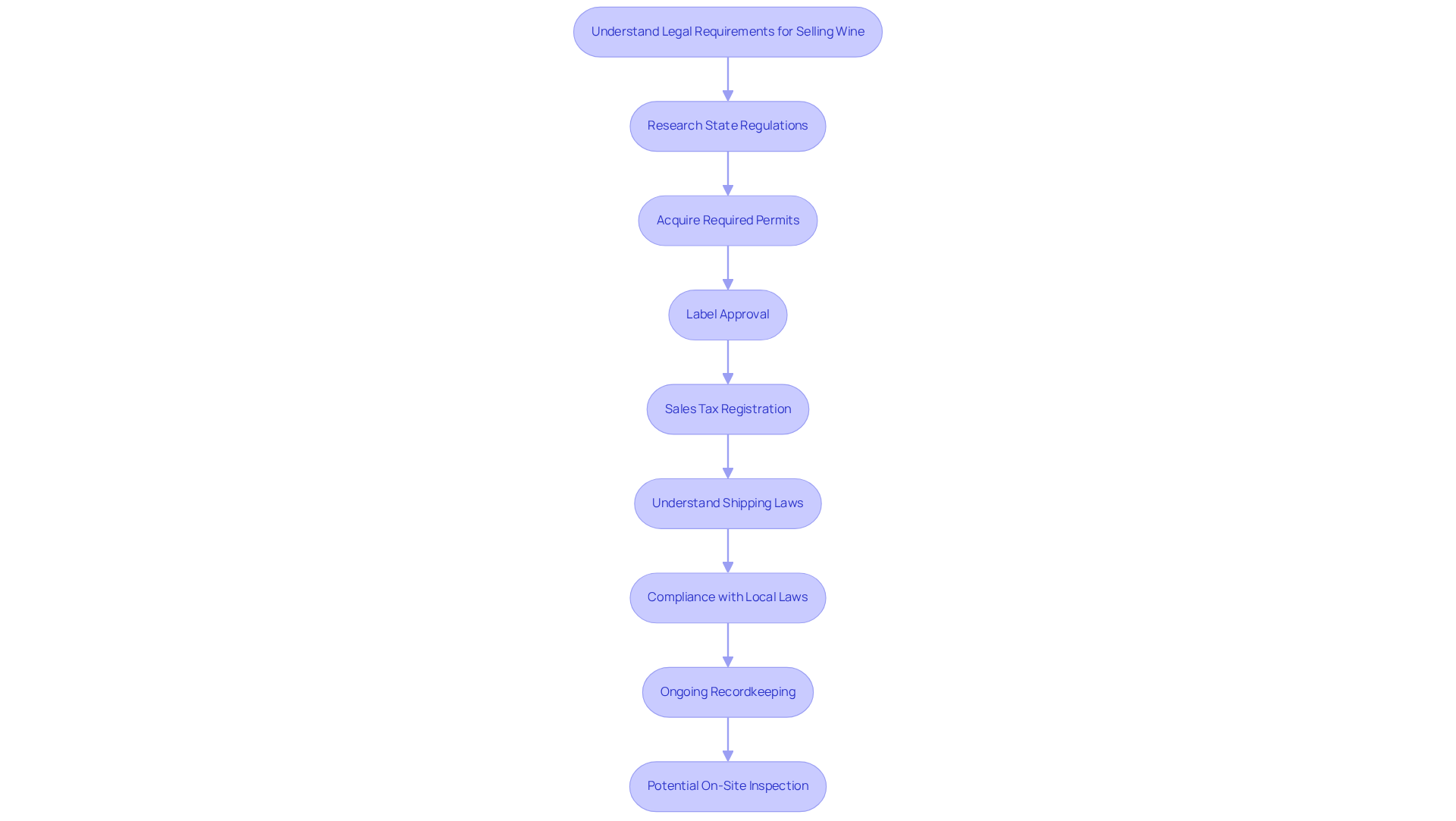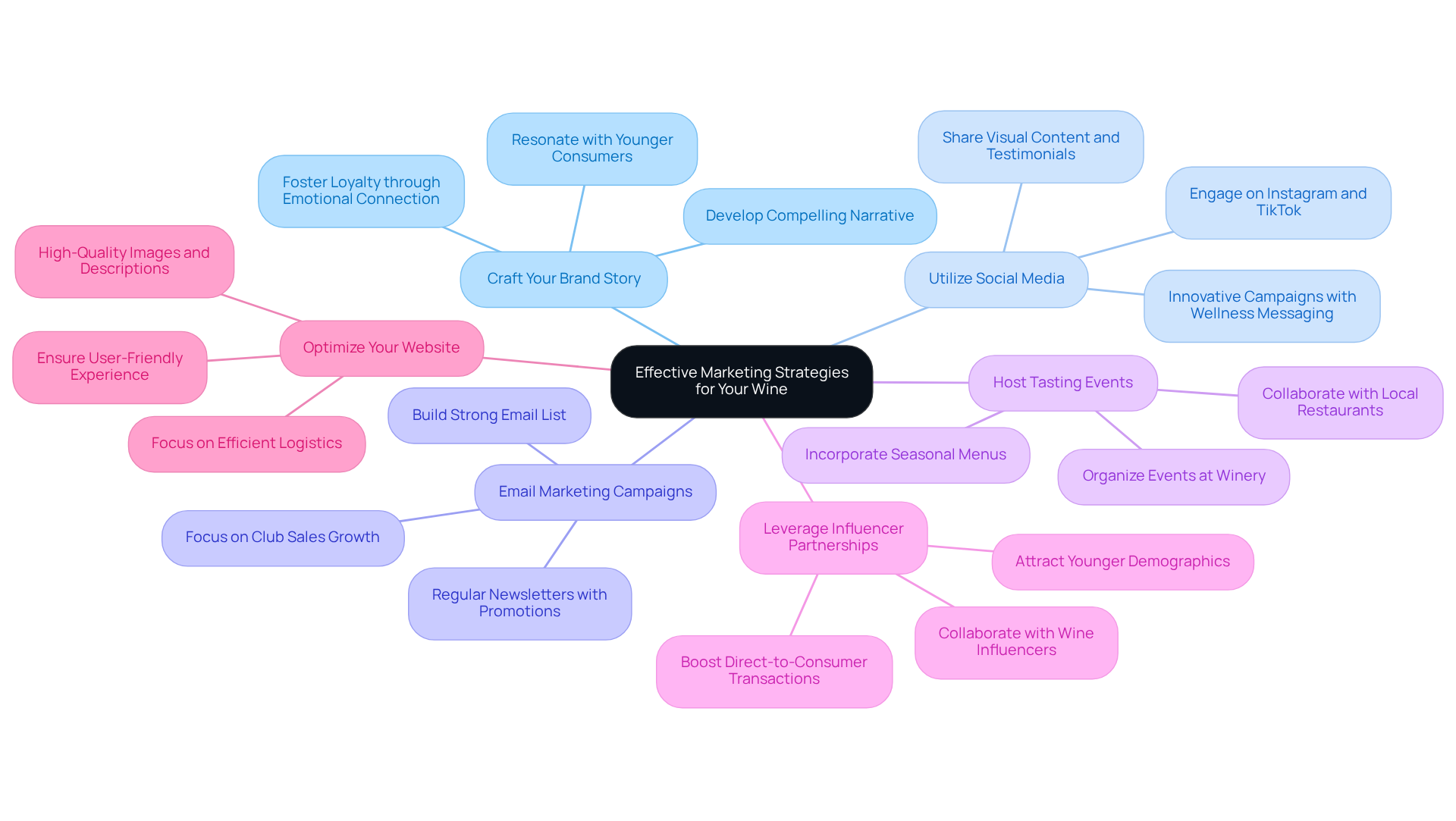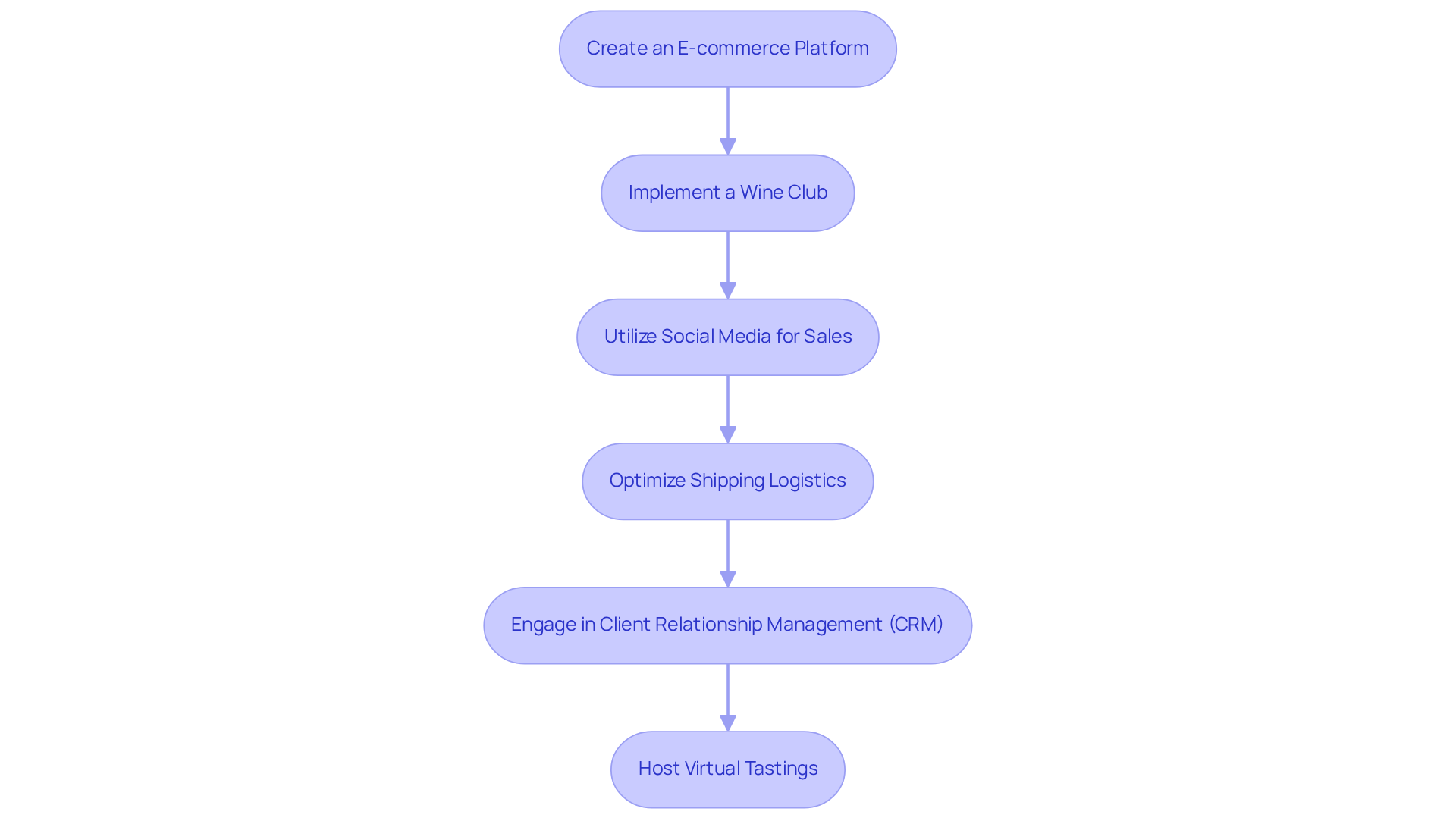Overview
Selling wine legally requires navigating a complex landscape of state and federal regulations. This includes obtaining the necessary licenses, ensuring label compliance, and understanding shipping laws. By outlining these legal steps, we not only clarify the requirements but also highlight effective marketing strategies that are crucial for success in this industry.
- Storytelling
- Social media engagement
- Direct-to-consumer sales channels
These elements not only capture attention but also build interest and generate desire among potential customers. To thrive in this competitive market, it is imperative to integrate these strategies with a solid understanding of the legal framework.
Introduction
Navigating the world of wine sales is as intricate as the winemaking process itself. The landscape is ever-evolving, marked by complex legal requirements and dynamic marketing strategies. Aspiring vintners encounter both opportunities and challenges as they seek to bring their creations to market. This guide explores essential legal steps and innovative marketing tactics that empower wine enthusiasts to successfully sell their products. It also addresses the complexities of compliance and consumer engagement.
How can one ensure adherence to regulations while simultaneously crafting a compelling brand that captivates a diverse audience?
Understand Legal Requirements for Selling Wine
To legally sell my wine, it is crucial to navigate the various licenses and permits required. Here’s a structured guide to ensure compliance:
- Research State Regulations: Each state has distinct laws governing the distribution of alcohol. Start by visiting your state’s Alcoholic Beverage Control (ABC) website to identify specific requirements.
- Acquire Required Permits: Depending on your position, you will generally need a Type 02 Winegrower License if creating beverages or a Type 17 Retail License if distributing them. Applications for federal permits should be submitted through the Alcohol and Tobacco Tax and Trade Bureau (TTB). Required forms include the Application to Establish and Operate Wine Premises Form 5120.25 and the Application for Basic Permit Under the FAA Act Form 5100.24.
- Label Approval: Ensure your beverage labels comply with TTB regulations by obtaining a Certificate of Label Approval (COLA) prior to any transactions.
- Sales Tax Registration: Register for a seller's permit to collect tax on beverage transactions, usually through your state’s Department of Revenue.
- Understand Shipping Laws: If selling wine online, familiarize yourself with , which differ by state. Some states may require additional permits for shipping.
- Compliance with Local Laws: Investigate local ordinances that may impose further restrictions or requirements for alcohol sales in your area.
- Ongoing Recordkeeping: After TTB approval, maintain accurate records as required by TTB regulations to ensure continued compliance.
- Potential On-Site Inspection: Be prepared for a TTB investigator to conduct an on-site inspection of your premises to verify compliance with application information and regulations.
In 2025, approximately 85% of vineyards reported compliance with TTB regulations, highlighting the importance of adhering to these legal frameworks. A recent case study demonstrated that vineyards that meticulously followed TTB guidelines not only avoided penalties but also enhanced their market reputation. By following these steps, I want to sell my wine while ensuring legal compliance and positioning my establishment for successful sales.

Develop Effective Marketing Strategies for Your Wine
To effectively market your wine, consider the following strategies:
- Craft Your Brand Story: Develop a compelling narrative that showcases your winery's heritage, production methods, and the passion behind your beverages. This story should resonate with your target audience, particularly younger consumers who in their purchasing decisions. Engaging them effectively is crucial, as they tend to make quicker purchasing decisions and demonstrate less loyalty to beverage brands. By creating a story that resonates emotionally, you can foster loyalty among casual purchasers and motivate them to join your club.
- Utilize Social Media: Interact with prospective clients on platforms like Instagram and TikTok, which are becoming essential avenues for beverage discovery. Share visually attractive material, behind-the-scenes insights of your establishment, and client testimonials to cultivate a community around your brand. Innovative campaigns that blend wellness messaging with your vineyard's heritage can resonate strongly with health-conscious consumers. Furthermore, approximately 20% of wineries are employing digital marketing strategies beyond social media to expand their clubs, which can further improve your outreach and encourage steady growth.
- Email Marketing Campaigns: Create a strong email list of clients and beverage enthusiasts. Regular newsletters featuring new releases, promotions, and events can keep your audience engaged and informed, enhancing customer loyalty. This is especially significant as club sales exceeded tasting room sales for the first time in 2022, representing 39% of all direct-to-consumer sales. Incorporating strategic capital planning can support these initiatives, ensuring you have the resources to maintain engagement and explore opportunities for debt, equity, or acquisitions.
- Host Tasting Events: Organize beverage tasting events at your winery or collaborate with local restaurants. These events not only enhance your beverages but also create unforgettable experiences that inspire return visits. Incorporating seasonal tasting menus can attract diverse audiences, including frugal consumers looking for unique experiences throughout the year. Such events can also act as a platform for storytelling, further strengthening your brand's connection with clients.
- Leverage Influencer Partnerships: Collaborate with wine influencers and bloggers to expand your reach. Their endorsements can lend credibility and attract new clients, particularly among younger demographics who are more likely to experiment with new brands. This approach can be especially impactful in boosting direct-to-consumer transactions and establishing a devoted clientele.
- Optimize Your Website: Ensure your website is user-friendly and optimized for e-commerce. High-quality images, detailed product descriptions, and a seamless checkout process are essential for enhancing the online shopping experience. With younger consumers expecting prompt delivery, efficient logistics should also be a priority. By focusing on these elements, you can create a sustainable direct-to-consumer channel that drives consistent growth.
By applying these tactics, I want to sell my wine, effectively promote my beverage, establish a devoted clientele, and maneuver through the competitive environment of the beverage sector, all while utilizing transformative DTC strategies and capital advisory to boost growth and loyalty.

Establish Direct-to-Consumer Sales Channels
To establish effective direct-to-consumer sales channels, consider the following strategic steps:
- Create an E-commerce Platform: Establish an online store that allows customers to browse and purchase your beverages directly. Select a platform that supports age verification and complies with alcohol sales regulations, ensuring a seamless shopping experience that reflects your brand's narrative.
- Implement a Wine Club: Develop a subscription-based wine club that provides members with exclusive access to new releases, discounts, and special events. This model not only generates a consistent revenue stream but also transforms casual purchasers into loyal club members, enhancing customer engagement and loyalty.
- Utilize Social Media for Sales: Leverage for direct sales in addition to marketing. Platforms such as Instagram now feature shopping capabilities that can drive traffic to your online store, enabling you to craft compelling narratives that resonate with your audience.
- Optimize Shipping Logistics: Collaborate with reliable shipping companies that understand the complexities involved in shipping alcohol. Adhere to all state regulations regarding the shipping of wine, which is crucial for maintaining client trust and satisfaction.
- Engage in Client Relationship Management (CRM): Employ CRM tools to track client interactions, preferences, and purchase history. This data can help tailor marketing efforts and enhance client service, ultimately supporting your strategic capital planning for growth.
- Host Virtual Tastings: Utilize technology to conduct virtual wine tastings. This approach can attract customers from diverse locations and provide an interactive experience that encourages purchases, reinforcing your brand's commitment to customer engagement.
By implementing these direct-to-consumer sales channels, you can significantly enhance your winery's reach and profitability, ensuring the longevity and success of your family-owned winery for generations.

Conclusion
Successfully navigating the intricate landscape of selling wine necessitates a profound understanding of both legal and marketing strategies. Entering the wine market effectively hinges on strict compliance with regulations, obtaining the necessary licenses, and deploying impactful promotional tactics. By emphasizing these critical elements, wine sellers not only ensure legality but also cultivate a brand that resonates deeply with consumers.
Key insights underscore the vital importance of:
- Comprehending state regulations
- Securing the appropriate permits
- Maintaining ongoing compliance to avert penalties
Moreover, crafting a compelling brand narrative, harnessing the power of social media, and engaging in direct-to-consumer sales strategies are essential for establishing a devoted customer base. Hosting events and optimizing e-commerce platforms serve to further elevate market presence and profitability.
Ultimately, the path to successful wine sales is multifaceted, intertwining legal diligence with innovative marketing approaches. Embracing these strategies positions wine sellers not only for immediate success but also fosters long-term growth and sustainability within a competitive industry. By taking proactive measures and continually adapting to market trends, wine entrepreneurs can cultivate a thriving brand that endures the test of time.
Frequently Asked Questions
What are the initial steps to legally sell wine?
The initial steps include researching state regulations by visiting your state’s Alcoholic Beverage Control (ABC) website and acquiring the required permits based on your role, such as a Type 02 Winegrower License or a Type 17 Retail License.
What permits are necessary for selling wine?
You generally need a Type 02 Winegrower License if creating wine or a Type 17 Retail License if distributing it. Federal permits must be submitted through the Alcohol and Tobacco Tax and Trade Bureau (TTB) using specific forms like Form 5120.25 and Form 5100.24.
How do I ensure my wine labels are compliant?
You must obtain a Certificate of Label Approval (COLA) from the TTB to ensure your beverage labels comply with regulations before any transactions occur.
Is sales tax registration necessary when selling wine?
Yes, you need to register for a seller's permit to collect sales tax on beverage transactions, typically through your state’s Department of Revenue.
What should I know about shipping wine?
If selling wine online, it’s important to understand direct-to-consumer (DTC) shipping laws, which vary by state. Some states may require additional permits for shipping.
Are there local laws that affect wine sales?
Yes, you should investigate local ordinances that may impose additional restrictions or requirements for alcohol sales in your area.
What records do I need to keep after obtaining TTB approval?
After TTB approval, you must maintain accurate records as required by TTB regulations to ensure ongoing compliance.
Will there be inspections involved in the process?
Yes, be prepared for a TTB investigator to conduct an on-site inspection of your premises to verify compliance with the application information and regulations.
What is the significance of compliance with TTB regulations?
Compliance with TTB regulations is crucial as approximately 85% of vineyards reported compliance in 2025, which helps avoid penalties and enhances market reputation.




